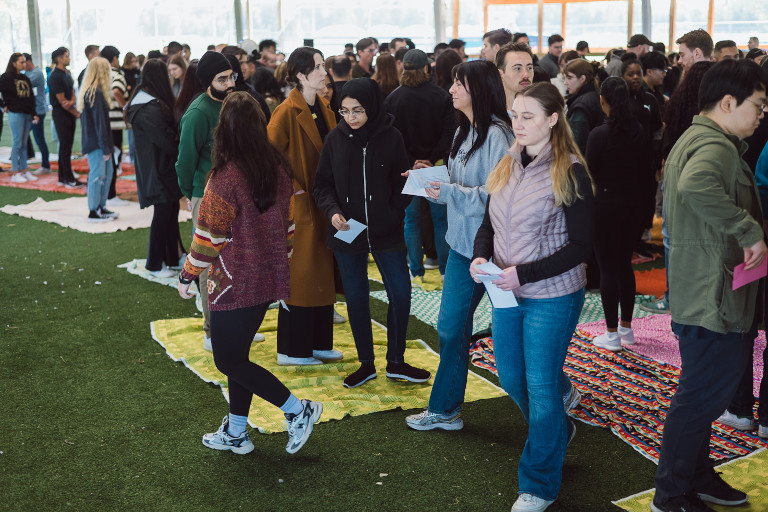Law-Adapted KAIROS Blanket Exercise an early and important experience for first-year Faculty of Law students
Douglas Johnson - 25 September 2024

As part of their Foundations orientation course, all first-year Faculty of Law students experienced something powerful. Nearly 200 students, joined by volunteers, organizers and other members of the University of Alberta community, attended this year’s KAIROS Blanket Exercise at powwow grounds of Maskêkosihk (Enoch Cree Nation).
“As new law students, you’re eager to get started - to read the leading cases, interpret the statutes, throw yourselves into the common law tradition. Today serves as an important pause on the assumption that the law resides only in court reports and statutes,” says Fiona Kelly, dean of law, in her address to the students.
“Indigenous laws have operated on this land for millenia and continue to do so today. Today provides an acknowledgement of the Indigenous lawmakers who have come before us and continue to practice their laws and governance principles on this land.”
Organized by the Wahkohtowin Law and Governance Lodge (WLGL), the law-adapted Blanket Exercise is an experiential learning opportunity, which was developed at the U of A and since adopted by several other law schools, including the University of Calgary and Dalhousie University. It has become a foundational part of the education offered by the Faculty of Law. Students learn about Indigenous laws, history and culture, and the tragic impact that colonial legal systems have had on Indigenous peoples and communities over the years.
For first-year student Melanie Taylor, a Two-Spirit Indigenous woman, the event helped reaffirm that studying at the U of A was the right choice.
“It has brought such hope and encouragement that the area of law is the right field for me in this current climate we find ourselves in,” she says. “The U of A is paving the way in displaying much needed true and meaningful reconciliation.”
The day started with a Pipe Ceremony, then the Blanket Exercise itself began. The exercise has attendees walking on a ground covered with blankets. Facilitators discuss and describe the Government of Canada’s seizure of Indigenous lands over centuries and, as this progresses, the blankets are removed. Throughout the exercise, and when particular historical events are mentioned, students are pulled out, representing losses of Indigenous people. After the exercise and lunch, students were invited to take part in a Give-away Ceremony. The day ended with everyone joining in a dance to an Honour song.
Professor Chris Sprysak, who taught the Foundations course this year, commented that the exercise was "an incredibly powerful, humbling and ultimately hopeful experience."
“I cannot think of a better way for our first-year students to begin their education in law, and for the service of their community,” he says.
Kathleen Makela, the Faculty of Law’s Indigenous support officer, provided student participants with the opportunity to take part in a smudge during the event’s debriefing. She says she was very pleased by how many non-Indigenous students wanted to participate in a smudge. For some, it was their first time. Others appreciated the guidance to ensure they smudge correctly on their own.
According to Makela, some of the non-Indigenous students said that smudging was somewhat similar to practices in their own cultures — and that the exercise felt interestingly familiar to them. “In those instances, both myself and the student marvelled over how interconnected our worlds are,” she says.
“I didn't expect such welcoming, encouraging, and curious reflections from non-Indigenous classmates after this exercise.”
Taylor recalls feeling glad that the Indigenous community was warm and welcoming, and that her fellow classmates responded so positively to the day’s events. Having grown up seeing the stigma Indigenous people, cultures and beliefs face, Taylor says she was incredibly pleased to see U of A students and staff so interested in learning about the true history of Indigenous peoples in Canada.
“I am overwhelmed by this class of young, first-year law students clearly wanting to challenge this stigma,” she says.
According to Koren Lightning, KC, legal director of the WLGL, the event is an incredibly important opportunity for first-year students. It helps shape their perspectives and understanding of Canadian and Indigenous legal traditions — and the difficult history between them.
“This knowledge challenges future lawyers to think about the kind of relationship they aspire to build moving forward — one grounded in respect, reconciliation and justice,” she says. “This early exposure will shape their approach to law and contribute to meaningful change in the profession.”